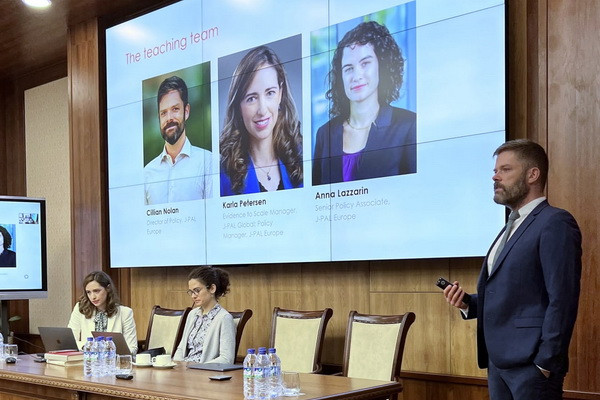
Rethinking ways to overcome poverty: J-PAL scientific and methodological seminar launched on the CERR platform
Tashkent, Uzbekistan (UzDaily.com) -- J-PAL, founded by Nobel laureates Abhijit Banerjee and Esther Duflo, together with CERR, organized a workshop to help develop and test innovative approaches in cooperation with the government of Uzbekistan to improve the effectiveness of state programs to combat poverty.
On 10 May 2022, a scientific and methodological seminar was held at the Center for Economic Research and Reforms (CERR) on the topic: "J-PAL and Uzbekistan: the beginning of cooperation and exchange of experience in combating poverty", in order to study the best world practices and methods for combating poverty, the formation of priority areas for future joint research with a special focus on social protection, employment and entrepreneurship issues, as well as education.
The event was opened by CERR Director Dr. Obid Khakimov, who addressed all the participants with a welcoming speech. He noted that the fight against poverty and the organization of social protection are in the center of attention of the state and over the past 5 years the country has done a lot of work in this direction. In particular, he recalled the relevant Decrees and Resolutions of the head of state aimed at further strengthening social protection and vulnerable segments of the population; on the launch of a new “mahallabay” system in Uzbekistan, as well as on one of the main goals of the New Uzbekistan Strategy - to reduce the level of poverty in the country by half by 2026.
Killian Nolan, policy director of J-PAL Europe, noted that the purpose of the visit to Uzbekistan is to provide technical support in research that can form the basis of the state’s programs to combat poverty and study the impact and effectiveness of such programs.
“We are in Uzbekistan to organize a seminar that will help evaluate the effectiveness of various anti-poverty measures, whether these methods helped to achieve poverty reduction goals, increase access to education, create jobs and positively affect the well-being of the population,” the expert noted.
During the seminar, many interesting questions were asked by the participants, in particular, how the research data could be applied.
“The study itself cannot change policy, but it can give us an idea of whether the program is working or not, and further influence the changes in such programs.
Our goal in Uzbekistan is to provide technical support, review research that can form the basis of government programs to combat poverty, study the impact and effectiveness of such programs, evaluate them in order to provide answers to questions from citizens, as well as ministries and departments responsible for poverty reduction, said Killian Nolan, policy director at J-PAL Europe, in response to questions.
During the workshop, J-PAL experts briefed attendees on the fundamentals of the methodology on which research work in the lab is based and how the results of poverty alleviation and social protection projects in various countries are being evaluated over time. In particular, the presentation cited the experience of Peru, India, South Africa, Indonesia, Saudi Arabia and Turkey.
Particular attention was devoted to evaluating the results of ongoing projects over time. According to Carla Petersen, Evidence Scaling Manager at J-PAL Global and Policy Manager at J-PAL Europe, “It takes from 6 months to two or more years to assess the impact of certain projects that J-PAL is implementing in different countries. , and it is not always possible to predict in advance whether these measures will have a positive effect or whether it would be better to leave this process to proceed on its own, because the opposite, negative effect of the actions taken is also possible.
“There are no guarantees that projects that have been accepted and successfully proven in one country will be just as successful in another, even taking into account similar factors in both countries. Each country needs an individual approach,” said Carla Petersen.
During the discussion, J-PAL experts and the participants of the event agreed that, first of all, it is important to conduct preliminary studies of the current situation in the country, as well as to study the measures already taken and launched initiatives for social protection and the fight against poverty in the republic in order to objectively assess and predict the potential impact of additional actions that J-PAL may recommend.
The methods and possibilities for collecting up-to-date information on counting the number of people in need, the role of the state in the implementation of incentive measures for social protection, as well as methods for collecting analytics and calculating the dynamics of the consequences of the measures taken were also actively discussed. In conclusion, the participants of the workshop exchanged contacts with J-PAL experts and agreed to exchange relevant information in order to start forming priority areas for future joint research in the coming years.